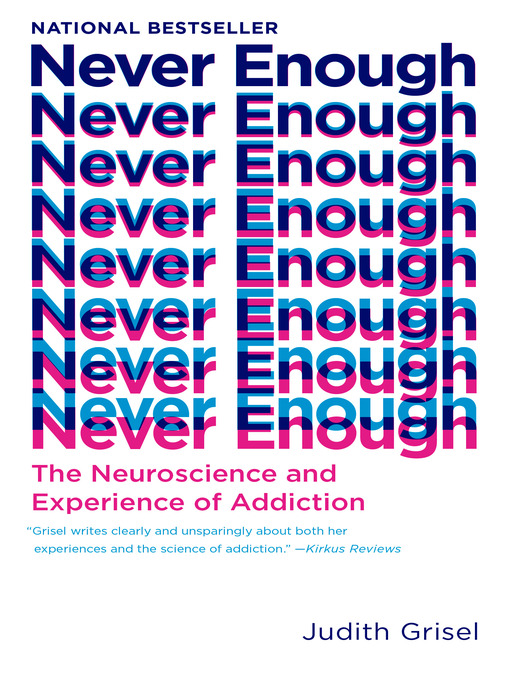
Never Enough
The Neuroscience and Experience of Addiction
علوم اعصاب و تجربه اعتیاد
کتاب های مرتبط
- اطلاعات
- نقد و بررسی
- دیدگاه کاربران
نقد و بررسی

December 1, 2018
What is it about our brains that causes us to crave things that are bad for us, and why are we experiencing an epidemic of addiction? The answers are joined--and, this book suggests, not always obvious.Unusually among academic researchers, behavioral neuroscientist Grisel (Psychology/Bucknell Univ.) has had extensive experience with nearly every addictive substance imaginable; her account of her wayward early 20s, chasing one high after another, is harrowing. A lesson she learned early on provides the title: "there will never be enough drug, because the brain's capacity to learn and adapt is basically infinite." That is to say, feed the brain addictive substances, and that new normal yields an insatiable hunger for homeostasis. "The brain's response to a drug," writes the author, "is always to facilitate the opposite state; therefore, the only way for any regular user to feel normal is to take the drug." The neurobiology of addiction is imperfectly and incompletely known, she writes; there is certainly a genetic component, while brain structures shape and reshape depending on what is passing through them. For instance, if cocaine is a kind of laser hitting a certain point, marijuana is "a bucket of red paint" that touches many neural centers with its feel-goodness. As for alcohol, suffice it to say that the "primary inhibitory neurotransmitter in the brain" gets caught up in the process, which helps explain some of the stupider things people do when drunk. It also explains why in moderate doses, anxiety is quelled while in greater doses it is activated, going back to that homeostasis model. Grisel writes clearly and unsparingly about both her experiences and the science of addiction--tobacco and caffeine figure in, as well--making plain that there is still much that remains unknown or mysterious about the brain's workings. In the end, she notes, much of our present culture, which shuns pain and favors avoidance, is made up of "tools of addiction."Illuminating reading for those seeking to understand the whos, hows, and wherefores of getting hooked.
COPYRIGHT(2018) Kirkus Reviews, ALL RIGHTS RESERVED.

January 1, 2019
Many scientists write about addiction, but how many are former addicts? Psychology professor Grisel mixes coverage of brain research with the warts-and-all story of her addictions, beginning with alcohol in seventh grade and progressing to marijuana, LSD, cocaine, and IV drug use. She also reveals that she contracted hepatitis C from sharing needles. Fortunately, she gets treatment and manages to stay clean, earn a PhD in behavioral neuroscience, and embark on an academic career. Many of her drug-using buddies were not so lucky; some even died. Addiction remains a vexing problem, with about 16 percent of the population over the age of 12 meeting the criteria for a substance-abuse disorder and about a quarter of all deaths attributed to excessive drug use. Successful recovery is no more likely than it was fifty years ago, she writes. Sure, opioids are a scourge, but she notes that in 2016, alcohol killed twice as many people as prescription opioids and heroin overdoses combined. Grisel's conclusion: Instead of wringing our hands, we might try holding one another's. Powerful stuff.(Reprinted with permission of Booklist, copyright 2019, American Library Association.)

February 1, 2019
Addiction is a pervasive problem of epic proportions both globally and in the United States, resulting in enormous financial cost and loss of life. Behavioral neuroscientist Grisel (psychology, Bucknell Univ.), who initially entered the profession with the goal of finding a cure for drug addiction after spending a decade as a hard-core addict herself, writes in an accessible style about how myriad drugs act on the brain. Alongside the scientific explanation are Grisel's remarkably candid descriptions of the effects of substance abuse, written with firsthand insight. Factors contributing to addiction include a genetic predisposition, as well as developmental and environmental influences--but anyone who experiences repeated exposure to mind-altering drugs is likely to develop a tolerance and subsequent dependence. Grisel offers a clear explanation of the neurobiology behind this process. VERDICT With knowledge and compassion, Grisel's work straddles two worlds--that of scientists and former addicts, and is recommended for anyone interesting in furthering their understanding of addiction. [See Prepub Alert, 7/30/18.]--Ragan O'Malley, Saint Ann's Sch., Brooklyn
Copyright 2019 Library Journal, LLC Used with permission.

February 1, 2019
A behavioral neuroscientist and a professor of psychology at Bucknell University, Grisel is also a former addict, which means she can explain not only the brain science behind addiction but the addict's actual experience. She takes us through how different drugs act on the infinitely adaptable brain and shows how the thrill of the occasional high turns into a ceaseless craving for the next fix: there is never enough. Grisel aims to clarify a more effective and more compassionate response to a crisis in which one in every five people over the age of 14 is addicted.
Copyright 2018 Library Journal, LLC Used with permission.

























دیدگاه کاربران